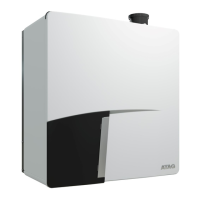Installation & Servicing Instructions ATAG Q-Series
14
6.3 6.3 Underoor heating system (plastic pipes)
When connecting or using an underoor heating system, designed with plastic
pipes, or plastic pipes are used elsewhere in the installation,one should ensure that
the plastic pipes used comply with the DIN 4726/4729 standard. It is set out in this
standard that the pipes may not have oxygen permeability higher than 0.1 g/m³.d at
40°C. If the system does not comply with this DIN standard, the underoor heating
component will have to be separated from the central heating appliance by means
of a plate exchanger.
No recourse can be made to the terms of the warranty in the event of failure
to observe the regulations pertaining to plastic underoor heating pipes.
6.4 Gas connection
The appliance pipe is tted with an internal thread, into which the tail piece of the gas
isolation valve can be screwed.
United Kingdom:
The gas supply must comply to the current Gas Safety Regulations.
Ireland:
- Irish standard 813
- Domestic gas installations
The connection to the appliance must include a suitable method of disconnection and
a gas control cock must be installed adjacent to the appliance for isolation purposes.
The nominal inlet working gas pressure measured at the appliance should be 20 mbar
for Nat gas (G20).
Make sure that the gas pipe work does not contain dirt, particularly with new
pipes.
When the boiler has to be converted from natural gas to LPG, ATAG provides special
kits for this purpose. Special instructions are supplied with the kit.
Always check the installation of all of the parts through which gas ows
(using leak-search spray)
6.5 Hot water supply
Connection of the drinking water installation should be done according to the national
water laws.
The sanitary water pipes can be connected to the installation by means of compression
ttings. The cold water inlet on the Combi boilers must be provided with the following
(counted in the water ow direction):
Dosing valve (supplied), Safety group, Expansion vessel 6bar (potable water, blue).
A dosing valve must be tted in the cold water pipe. The dosing valve ensures that
a quantity of water is supplied which has a guaranteed outlet temperature of 60°C
(assuming a cold water temperature of 10°C). The quantity of water is virtually
unaffected by the water pressure.
With a water pressure lower than 1.5 bar it is advisable to remove the inside
mechanism of the dosing valve.

